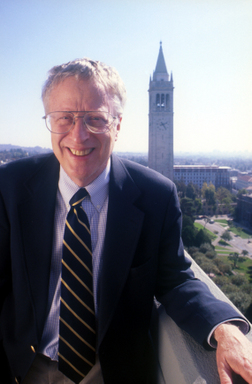Economics and Identity:
Moving Beyond the Doctrine of Selfishness
Professor Akerlof won the Nobel Prize in Economics in 2001. A graduate
of Yale and MIT, Dr. Akerlof has been President of the American
Economic Association and is a trustee of the Economists for Peace and
Security. In the conclusion to his acceptance speech for his Nobel Prize,
Dr. Akerlof stated that: "Economics is a far richer field with more
interesting, realistic, and detailed models than when I first entered
the profession. There is now an increased willingness to base economics
on findings in the other social sciences. Over the last thirty years we
have been gradually evolving an economics that relies more on careful
empirical observation, and less on questionable assumption regarding
how rational people must behave. It has been a great pleasure to have
been a contributor to this development."
Special lottery draw
Followinhg the lecture, there will be a draw for tickets to the
Chan Centre for the March 14 lecture by Dr. Mohammad Yunus.
Please see his lecture page for details.
Background Information
(These references were compiled by
the webmaster in the hope that they will prove interesting to some readers.
The web being what it is, some of them will have vanished by the time
you go to look them up, and there is—of course—no guarantee
of their accuracy.)
-
Wikipedia entry
-
George Arthur Akerlof (born June 17, 1940) is an American
economist and Koshland Professor of Economics at the University
of California, Berkeley. He won the 2001 Nobel Prize in Economics
(shared with Michael Spence and Joseph E. Stiglitz). His father
was Swedish and his mother a Jewish/German-American.
Akerlof is perhaps best known for his article, "The Market for
Lemons: Quality Uncertainty and the Market Mechanism", published
in Quarterly Journal of Economics in 1970, in which he identified
the severe problems that may afflict markets characterized by
asymmetrical information. ...
-
Autobiography
-
College and graduate school
Regarding college, I had no choice. My brother had gone to
Yale. Even if my brother's choice were not over-riding for my
decision, I would probably have heeded the assistant principal of
Lawrenceville, who admonished me that I should not wreck my life
by even thinking about going to Harvard instead. My first two
years at Yale were mainly spent in taking liberal arts courses
and working on The Yale Daily News. My last two
years were spent learning economics, and then math. When I went
to Yale, I was convinced that I wanted to be either an economist
or an historian. Really, for me it was a distinction without a
difference. If I was going to be an historian, then I would be
an economic historian. And if I was to be an economist I would
consider history as the basis for my economics. ...
-
US Nobel Laureate Slams Bush Gov't as "Worst"
in American History
-
Published on Tuesday, July 29, 2003 by IRNA and Der Spiegel
(Berlin)
BERLIN - American Nobel Prize laureate for Economics George
A. Akerlof lashed out at the government of US President George
W. Bush, calling it the "worst ever" in American history, the
online site of the weekly Der Spiegel magazine reported Tuesday.
"I think this is the worst government the US has ever had in its
more than 200 years of history. It has engaged in
extradordinarily irresponsible policies not only in foreign
policy and economics but also in social and environmental
policy," said the 2001 Nobel Prize laureate who teaches
economics at the University of California in Berkeley. ...
[The page includes text of Der Spiegel interview.]

